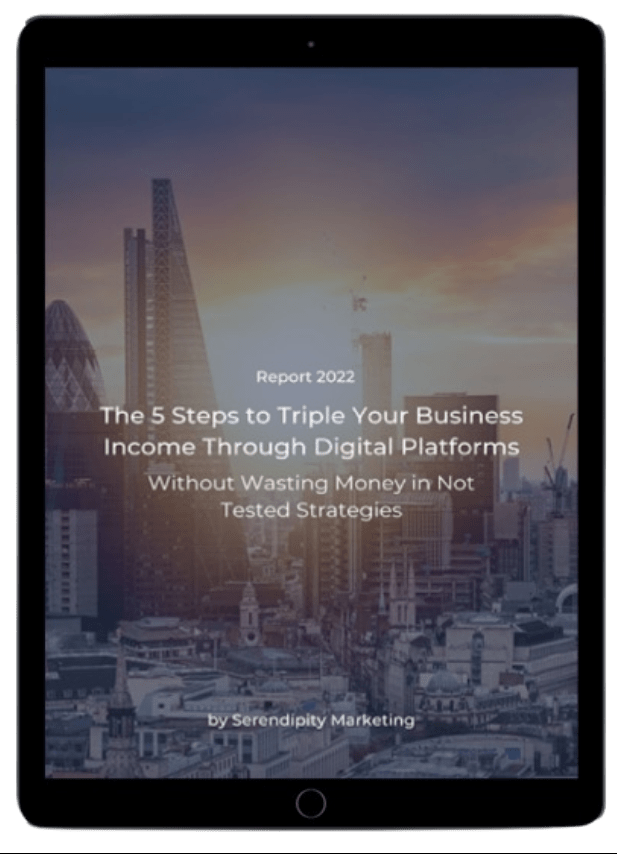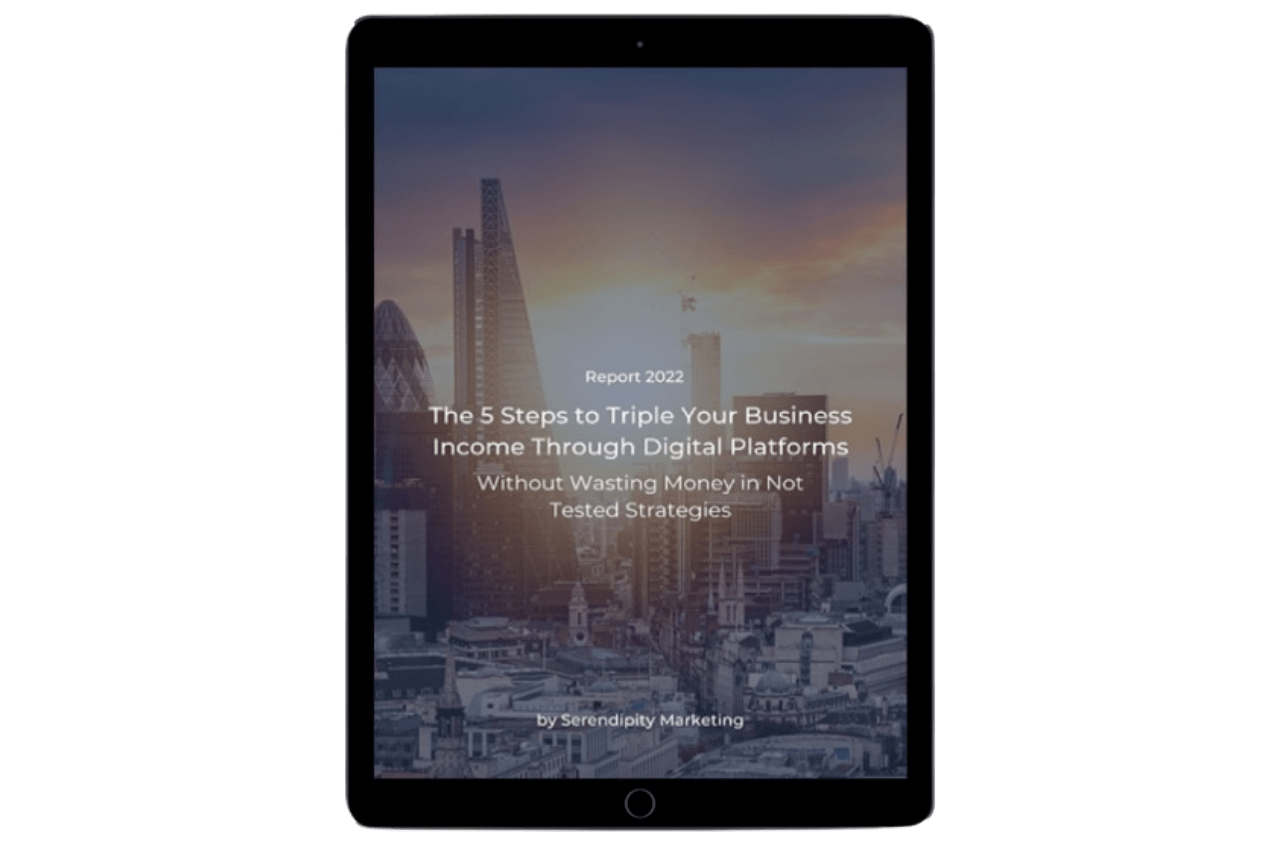Organic marketing strategy or advertising strategy? What should you choose to get higher traffic and profit?
Google generates over 100 billion dollars through paid advertising, per year. Facebook generates over 40 billion dollars a year in revenue through paid advertising.
And that’s because advertising works and a lot of businesses use it.
However, due to the high competition, it is getting more and more difficult to run profitable ad campaigns.
And truth is that there are organic marketing strategies that allow you to get higher results in the long run without spending money on ads.
In this article, we are going to share with you our number one organic marketing strategy for higher profit.
Hi there, and welcome back to Serendipity Marketing. We're a digital marketing agency with a mission to help small businesses grow by applying psychology to their marketing strategies.
Before we get started, please go ahead and follow us on LinkedIn, Facebook, or Instagram.
Before we get started, we have a question for you; How many of you leverage paid advertising? If you spend money on Google Adverse or Facebook ads, or Taboola, Outbrain, or any of those sites, just leave a comment below with yes. If you don't, leave a comment with no.
This way, we can understand better the content you would benefit the most from and we can create new pieces with other information that will help you boost your business.
So, here's the thing about paid advertising. Yes, it can generate an ROI. And if it's positive for you, you should be doing it.
But the majority of the traffic doesn't go to the paid listings, and we are going to show you one hack, which is how we get the majority of our qualified traffic.
It works really well, and as it generates highly qualified traffic, it is responsible for our highest conversion rate and profit.
Optimize your content
So, you have a website, you have a blog, you're writing content, and you're already ranking for something other than your brand name.
If you don't know what you rank for, go log in to the Google Search Console.
Go into the Google Search Console, it'll show you all the terms that you're ranking for. Look for the most popular terms.
Now that you've seen the terms that you're ranking for, look to see what page it's going to.
Now that you know what page most of your traffic is going to, you know the amount of visitors each page is generating from the keyword it’s ranking for.
Let's say you rank for the term “digital marketing” as we do. If you want to take that phrase, head over to Ubersuggest and paste it there.
Ubersuggest will show you all the long tail variations of that keyword. These long-tail variations are other variations of it, like “digital marketing jobs”, and “digital marketing consultant”.
Whatever they may be, they're longer tail phrases of the head term, digital marketing.
You want to take those terms, like “digital marketing jobs”, and “digital marketing tips”, and see which ones are relevant to the article or the page that's already ranking.
Then, you want to go to that page, and let's say it's ranking for the keyword “digital marketing”, and you want to end up rewriting the content to be more detailed to include the long-tail phrases that you haven't already included.
What you'll find is that Ubersuggest shows you the most popular terms that are related to the head term, they're just longer variations.
And it even lists them out in order based on popularity.
If you take a minute, to integrate them into your content, you'll find that within 30 to 60 days at the latest, you'll also start ranking for all those long-tail phrases.
Now, the trick with this marketing strategy part isn't to just take those words like “digital marketing tips” and just use them in your content everywhere.
Because if you spam, it creates a terrible experience and people are going to bounce back.
Instead, you need to adjust your content.
So, our most popular articles that got to rank on Google's first page are longer than 5,000 words.
And, that’s because we kept going in, taking all these keywords and adjusting that content so that they are not only just about the main keyword but also the long-tail variations are well included in the text.
And by going in-depth on all of the ones that are relevant, because you still want the article to flow, you will notice that you'll quickly rank.
We've also tested the experience of just shoving in those long-tail phrases. And it doesn't work if you don't adjust your content.
Optimize the title tag and meta description
Now that you've adjusted your content, make sure you take some of the most popular long-tail phrases and put them in your title tag and meta description.
When you do a Google search, the title you see is the title tag and the sentence description under it is the meta description.
By including those keywords, or some of them, within your title tag and meta description, you'll also find that is easier and faster to rank for them.
Also, by including them, users will identify your content with the keywords they use to search the information they need for, and they will be more incentivised to click.
And the more clicks you get, the quicker and higher your content will rank.
Alright, now before we move on with the next organic marketing strategy parts, have you ever thought about how much you should invest in marketing to generate constant business growth? Click the button below to calculate the ideal marketing budget you should allocate for higher visibility, engagement, and profit.
How much should you invest in a Digital Marketing Agency?
Link to other sites
Now, the last thing we want you to do is that when you're updating your article, you have to feel free to link out to other sites that are your sources or that could be relevant and benefit your audience.
Because when you're linking out to other people, it makes them flattered and happy.
And if it's good for your audience, it also makes their life better as well.
So, let's say we link out to a guy named John, and he has an amazing online marketing blog. We'll notify him by sending an email like:
“Hi John, we have to say we are huge fans of your work on “name of their blog”. So much that we even linked out to you in our latest post. You can check it out here. Cheers. P.S. if you share the post, it will make our day.”
And you'll find that a lot more people will share your content on Facebook and Twitter.
This will get it more visibility and some of those people will then, even link back to you which will boost your rankings for the main terms as well as all those secondary terms.
Conclusion
That's it, just doing that one little hack will get you so much more organic qualified traffic.
It takes some time to perform this organic marketing strategy, but it will help you set yourself as a trustworthy authority people can rely on.
And all the results you get in terms of traffic will be permanent and build up momentum rather than stop as soon as you stop paying Facebook or Google for your ads.
You will stand out for the extreme value you offer people, and you’ll generate traffic that’s extremely qualified – meaning that you’ll achieve a higher conversion rate and profit.
And all without spending money on ads.
If you need help with your organic marketing strategy to grow your business in terms of visibility, engagement, and profit, contact us today and speak with one of our digital marketing experts to see how we can build the bridge between the point you’re standing at right now and your goals.


